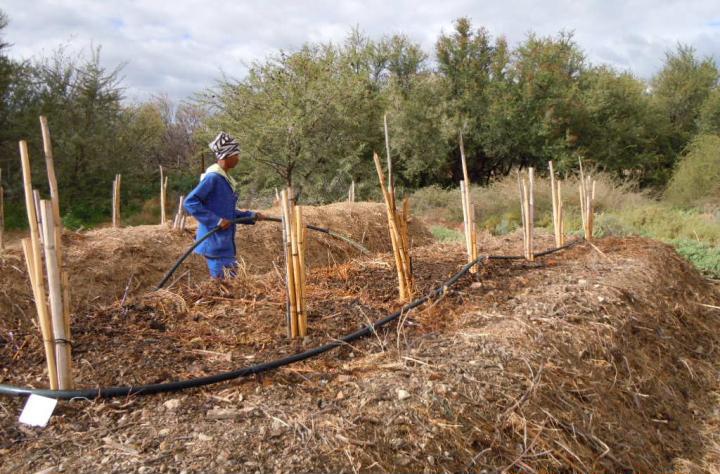Suzanne Jane Milton-Dean
Other projects
18 Dec 2007
"Renu-Karoo": Developing Indigenous Seed Orchards and Local Skills to Restore Mining and Grazing Damage in Arid Karoo Rangeland I
7 Jun 2010
"Renu Karoo": Developing Indigenous Seed Orchards and Local Skills to Restore Mining and Grazing Damage in Arid Karoo Rangeland III
25 Jul 2012
"Renu-Karoo": Developing Indigenous Seed Orchards and Local Skills to Restore Mining and Grazing Damage in Arid Karoo Rangeland IV
The project will train and employ local people to collect and grow seeds of indigenous plants for use in ecological restoration in arid Karoo rangeland damaged by over-grazing or mining.

Sewage grey water in compost making. Renu-Karoo has been using “environmentally safe” treated water from the sewage works for keeping the compost moist.
The Renu-Karoo project and business idea grew from our concerns about the need for returning indigenous forage plants to rangelands where they had been reduced by overgrazing, and from our wish to see areas damaged by mining revegetated with appropriate indigenous plants. We also wanted to develop marketable skills and employment opportunities in our village. We therefore started Renu-Karoo Veld Restoration cc, a biodiversity-based business situated in a private nature reserve, on the edge of the small rural village of Prince Albert in the arid Karoo.
The business is built around four products, namely:
(1) indigenous seeds (grown in our seed orchard and locally collected);
(2) indigenous plants (grown on site);
(3) compost produced from village garden waste;
(4) expert advice on ecological restoration and conservation.
Immediate benefits of the early phase of the project are that Renu-Karoo employs five young people from the village, as well as two students who need to spend a year gaining practical experience in nature conservation before completing their coursework.
Research and training are integral to our project. Staff training in 2008 included compost making and attendance of a week-long plant propagation course. Renu-Karoo is involved in restoration experiments on quarry and rangeland sites, including degraded ostrich camps, and is collaborating with economists, ecologists, and their Masters students, at a number of Universities to quantify the economic and ecological benefits of ecological restoration.
Through its daily work, Renu-Karoo mainstreams the notions of nature conservation, recycling and restoration, as a growing number of villagers bring their green waste to us, buy indigenous plants, and discuss rangeland management, or takes walks in the conservation area.
We are collaborating with the local municipality in waste reduction, woodlot development and seed collection. A government-subsidised seed collection project in the two poorly-resourced villages of Klaarstroom and Leeugamka, within a 50 km radius of our village in scheduled to start in 2009. This initiative will be guided by Renu-Karoo, which will also market the seeds. Working with local government and business gives Renu-Karoo many opportunities to raise awareness issues pertinent to conservation, sustainable use and restoration of natural resources.
Although the infrastructure is costly and development of markets for our services has been challenging to date, we believe that the business will become self-sustaining in the medium-term as the concept of ecological restoration is mainstreamed.